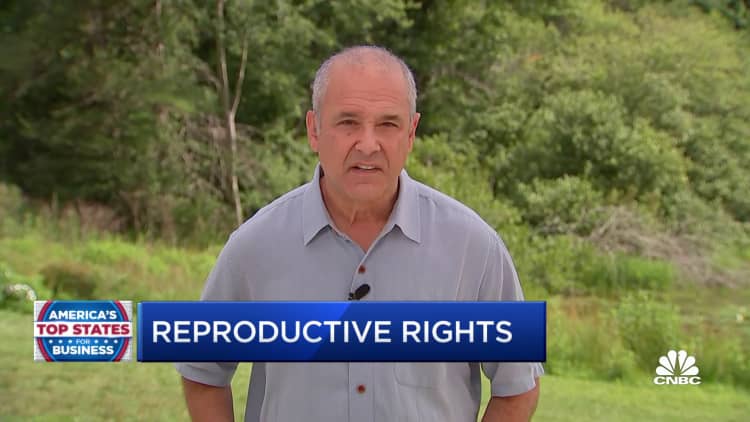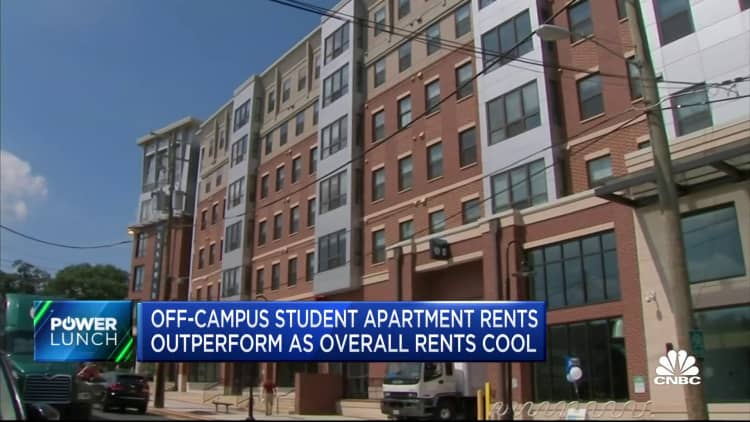[ad_1]
Faith Halstead, chants along with other protesters and activists near the Florida State Capitol where Florida State Senators voted to pass a proposed 6-week abortion ban in Tallahassee, Florida, on Monday, April 3, 2023.
The Washington Post | Getty Images
The youngest generation of American workers is prepared to move away from states that pass abortion bans and to turn down job offers in states where bans are already in place, a new survey from CNBC/Generation Lab finds.
The “Youth & Money in the USA” survey of 1,033 people between the ages of 18 and 34 found that almost two-thirds of respondents, 62%, would “probably not” or “definitely not” live in a state that banned abortion.
And 45% of those surveyed said that if they were to be offered a job in a state where abortion is illegal, they would either “definitely reject” or “probably reject” the offer. Another 35% said they would “probably accept” the job. And only 20% of respondents said they would definitely take the job.
“These numbers on abortion have gigantic implications for just about every large company in America,” said Cyrus Beschloss, the CEO of The Generation Lab. “Companies must know they’ll be freezing out or at least scaring a large part of the young talent they’re trying to hire when they’re based in one of these states.”
The Supreme Court’s 2022 ruling that overturned Roe v. Wade set off a cascade of legal challenges and legislative efforts at the state level. In the past two years, more than 20 states have either banned or restricted access to the procedure.
Abortion rights supporters hold placards on the day the Supreme Court justices hear oral arguments over the legality of Idaho’s Republican-backed, near-total abortion ban in medical-emergency situations, at the U.S. Supreme Court in Washington, U.S., April 24, 2024.
Kevin Lamarque | Reuters
Yet findings like these suggest that state abortion bans could have a profound effect on how and where the next generation of American workers will live. And by extension, on the companies that will hire them.
The CNBC/Generation Lab survey was conducted between April 26 and May 2, and has a margin of error +/- 3.1%.
Sour on the economy
The survey also found that respondents had a negative opinion of an economy many would consider robust.
Despite historically low jobless rates, only 6% of those polled consider the current job market to be “great.” Another 38% said it is “satisfactory,” while 44% felt “pretty bad” was most accurate, and 11% opted for “extremely bad.”
The latest employment report released by the U.S. government last Friday showed job growth slowed more in April than economists had been expecting. But the overall unemployment rate is under 4% for the twenty-seventh straight month, indicating the overall job market is still strong. That same report showed annual wage growth at 3.9% for the twelve months through April, the first time since June 2021 it has fallen below 4%.

Investing, inflation and housing
The CNBC/Generation Lab poll also found that Americans between 18 and 34 years old feel trapped in the grip of high inflation. After the Federal Reserve left rates unchanged at its most recent meeting, Chairman Jerome Powell said “inflation is still too high.”
Even so, the path to bringing it down is “uncertain,” Powell said at a press conference in Washington.
The survey showed that 54% of respondents feel inflation impacts them the most in “the cost of food.” Rent inflation came in second, with 22% saying that’s where they most feel higher prices, followed by discretionary spending, health-care costs and utility bills.
High prices also showed up as a major concern when it comes to housing, with 68% of those surveyed saying they find housing is available, but “not affordable.” An additional 21% said housing is “too hard to find.”

Mortgage rates remain elevated, in the 7.5% range. Those higher rates make it difficult for current homeowners to trade up, and the resulting lack of turnover leaves many potential first-time buyers out in the cold.
“A lot of young people are trying to buy a home, but there are serious challenges right now,” said Delano Saporu, CEO of New Street Advisors Group, a wealth management firm focused on younger investors. Saporu described his clients as largely middle income with a steady job and salary.
“Rates are putting extra pressure on client budgets and limiting their potential to buy now,” he said. “Many are waiting and hoping future Fed cuts will bring mortgage rates down.”
Both Saporu and the poll found that enthusiasm for investing has waned after last year’s market run. Asked by CNBC/Generation Lab pollsters how they invest their money, 42% of respondents said they are “not investing or saving right now.” Another 18% said they keep all of their money in cash.
“The excitement over buying stocks has deflated,” said Saporu. “People are less optimistic about investing as the market has stopped running up so far and so fast.”
Only 17% of young people in the survey said they are currently investing in stocks.
“Over the last few years clients may have heard about some random crypto coin or stock and wanted in, I’m seeing a lot less of that now,” said Saporu.
TikTok and four-day weeks
Two key social issues are prominent rallying cries for a large majority of respondents in this poll. The first is TikTok. President Joe Biden recently signed a bill passed overwhelmingly by Congress that could force the popular app’s Chinese owner to sell the company or face a U.S. ban.
Offered two options of how the government should proceed with TikTok, a large majority — 70% — of survey respondents said it should “allow TikTok to keep operating as usual.” The other 30% said they would prefer the U.S. ban TikTok.
TikTok creators gather before a press conference to voice their opposition to the “Protecting Americans from Foreign Adversary Controlled Applications Act,” pending crackdown legislation on TikTok in the House of Representatives, on Capitol Hill in Washington, U.S., March 12, 2024.
Craig Hudson | Reuters
A second social issue is the growing debate over a four-day workweek. In a recent exclusive interview on CNBC, the owner of the New York Mets and head of the hedge fund Point 72, Steve Cohen, said he believed a four-day workweek was a realistic possibility.
Among young people surveyed, a whopping 81% said they believed it would make their workplace more productive, while only 19% said productivity would suffer.
Biden vs. Trump vs. Kennedy
The coming November presidential election appears to be reshaping some traditional youth voting patterns, at least for now.
If the election were held today, CNBC and Generation Lab’s survey found that younger voters split almost evenly between Biden and former President Donald Trump, with just 1 percentage point separating the two — 36% to 35% — in favor of Biden.
Former US President Donald Trump speaks during a campaign event at the Waukesha Expo Center in Waukesha, Wisconsin, US, on Wednesday, May 1, 2024.
Daniel Steinle | Bloomberg | Getty Images
But in a three-candidate race, a whopping 29% of respondents said they would vote for Robert F. Kennedy Jr.
Yet it’s unclear at this point in the presidential race exactly who Kennedy’s candidacy threatens most, Biden or Trump. Recent polling suggests that Kennedy, a vaccine skeptic from a Democratic dynasty, may in fact be pulling more support away from Trump than he does from Biden.
What’s more, 40% of respondents believe Trump would be more effective in handling the economy, compared with 34% for Biden and 25% for Kennedy.
Generation Lab’s Beschloss called those numbers “jarring” for Democrats.
Yet this year, the downward drag of inflation and economic pessimism could be overwhelmed by a massive wave of reproductive rights voters, who tend to break sharply for Democrats at the ballot box.
Several states are also expected to have initiatives on the ballot in November that would enshrine abortion rights into their constitutions. Battleground Arizona and Republican-friendly Florida are two places wheere these initiatives could energize Democratic voters.
[ad_2]
Source link